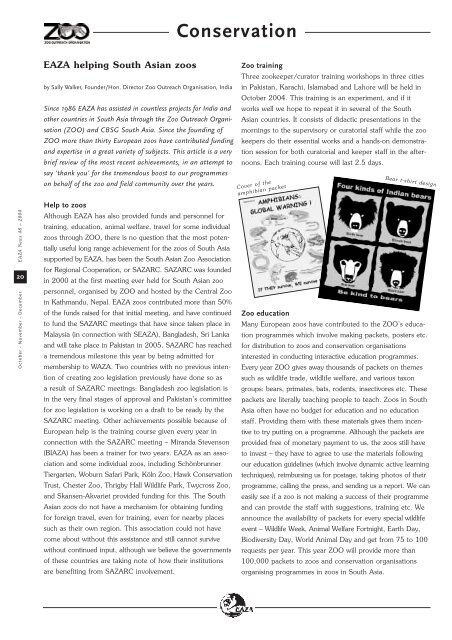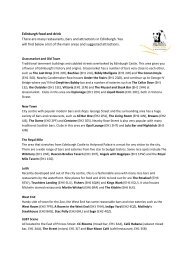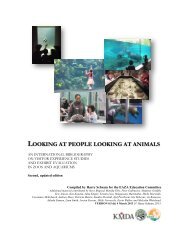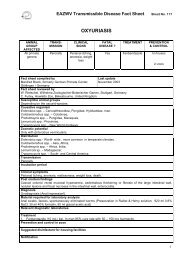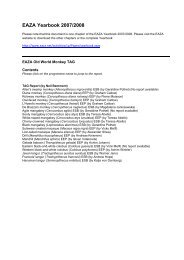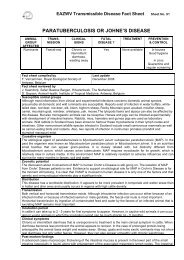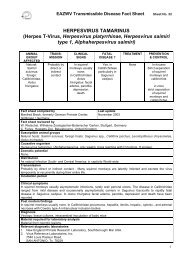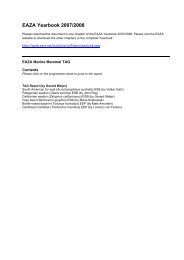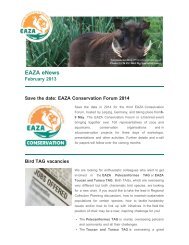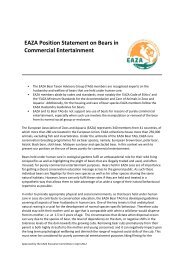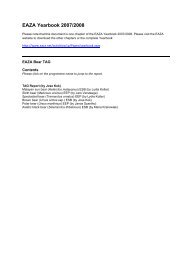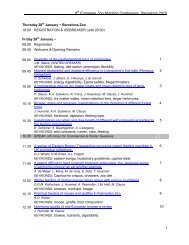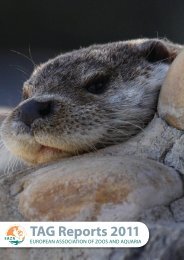EAZA NEWS 48 - European Association of Zoos and Aquaria
EAZA NEWS 48 - European Association of Zoos and Aquaria
EAZA NEWS 48 - European Association of Zoos and Aquaria
Create successful ePaper yourself
Turn your PDF publications into a flip-book with our unique Google optimized e-Paper software.
<strong>EAZA</strong> News <strong>48</strong> – 2004<br />
20<br />
October - November - December<br />
<strong>EAZA</strong> helping South Asian zoos<br />
f<br />
by Sally Walker, Founder/Hon. Director Zoo Outreach Organisation, India<br />
Since 1986 <strong>EAZA</strong> has assisted in countless projects for India <strong>and</strong><br />
other countries in South Asia through the Zoo Outreach Organisation<br />
(ZOO) <strong>and</strong> CBSG South Asia. Since the founding <strong>of</strong><br />
ZOO more than thirty <strong>European</strong> zoos have contributed funding<br />
<strong>and</strong> expertise in a great variety <strong>of</strong> subjects. This article is a very<br />
brief review <strong>of</strong> the most recent achievements, in an attempt to<br />
say 'thank you' for the tremendous boost to our programmes<br />
on behalf <strong>of</strong> the zoo <strong>and</strong> field community over the years.<br />
Help to zoos<br />
Although <strong>EAZA</strong> has also provided funds <strong>and</strong> personnel for<br />
training, education, animal welfare, travel for some individual<br />
zoos through ZOO, there is no question that the most potentially<br />
useful long range achievement for the zoos <strong>of</strong> South Asia<br />
supported by <strong>EAZA</strong>, has been the South Asian Zoo <strong>Association</strong><br />
for Regional Cooperation, or SAZARC. SAZARC was founded<br />
in 2000 at the first meeting ever held for South Asian zoo<br />
personnel, organised by ZOO <strong>and</strong> hosted by the Central Zoo<br />
in Kathm<strong>and</strong>u, Nepal. <strong>EAZA</strong> zoos contributed more than 50%<br />
<strong>of</strong> the funds raised for that initial meeting, <strong>and</strong> have continued<br />
to fund the SAZARC meetings that have since taken place in<br />
Malaysia (in connection with S<strong>EAZA</strong>), Bangladesh, Sri Lanka<br />
<strong>and</strong> will take place in Pakistan in 2005. SAZARC has reached<br />
a tremendous milestone this year by being admitted for<br />
membership to WAZA. Two countries with no previous intention<br />
<strong>of</strong> creating zoo legislation previously have done so as<br />
a result <strong>of</strong> SAZARC meetings: Bangladesh zoo legislation is<br />
in the very final stages <strong>of</strong> approval <strong>and</strong> Pakistan’s committee<br />
for zoo legislation is working on a draft to be ready by the<br />
SAZARC meeting. Other achievements possible because <strong>of</strong><br />
<strong>European</strong> help is the training course given every year in<br />
connection with the SAZARC meeting – Mir<strong>and</strong>a Stevenson<br />
(BIAZA) has been a trainer for two years. <strong>EAZA</strong> as an association<br />
<strong>and</strong> some individual zoos, including Schönbrunner<br />
Tiergarten, Woburn Safari Park, Köln Zoo, Hawk Conservation<br />
Trust, Chester Zoo, Thrigby Hall Wildlife Park, Twycross Zoo,<br />
<strong>and</strong> Skansen-Akvariet provided funding for this. The South<br />
Asian zoos do not have a mechanism for obtaining funding<br />
for foreign travel, even for training, even for nearby places<br />
such as their own region. This association could not have<br />
come about without this assistance <strong>and</strong> still cannot survive<br />
without continued input, although we believe the governments<br />
<strong>of</strong> these countries are taking note <strong>of</strong> how their institutions<br />
are benefiting from SAZARC involvement.<br />
Conservation<br />
Zoo training<br />
Three zookeeper/curator training workshops in three cities<br />
in Pakistan, Karachi, Islamabad <strong>and</strong> Lahore will be held in<br />
October 2004. This training is an experiment, <strong>and</strong> if it<br />
works well we hope to repeat it in several <strong>of</strong> the South<br />
Asian countries. It consists <strong>of</strong> didactic presentations in the<br />
mornings to the supervisory or curatorial staff while the zoo<br />
keepers do their essential works <strong>and</strong> a h<strong>and</strong>s-on demonstration<br />
session for both curatorial <strong>and</strong> keeper staff in the afternoons.<br />
Each training course will last 2.5 days.<br />
Cover <strong>of</strong> the<br />
amphibian packet<br />
Bear t-shirt design<br />
Zoo education<br />
Many <strong>European</strong> zoos have contributed to the ZOO’s education<br />
programmes which involve making packets, posters etc.<br />
for distribution to zoos <strong>and</strong> conservation organisations<br />
interested in conducting interactive education programmes.<br />
Every year ZOO gives away thous<strong>and</strong>s <strong>of</strong> packets on themes<br />
such as wildlife trade, wildlife welfare, <strong>and</strong> various taxon<br />
groups: bears, primates, bats, rodents, insectivores etc. These<br />
packets are literally teaching people to teach. <strong>Zoos</strong> in South<br />
Asia <strong>of</strong>ten have no budget for education <strong>and</strong> no education<br />
staff. Providing them with these materials gives them incentive<br />
to try putting on a programme. Although the packets are<br />
provided free <strong>of</strong> monetary payment to us, the zoos still have<br />
to invest – they have to agree to use the materials following<br />
our education guidelines (which involve dynamic active learning<br />
techniques), reimbursing us for postage, taking photos <strong>of</strong> their<br />
programme, calling the press, <strong>and</strong> sending us a report. We can<br />
easily see if a zoo is not making a success <strong>of</strong> their programme<br />
<strong>and</strong> can provide the staff with suggestions, training etc. We<br />
announce the availability <strong>of</strong> packets for every special wildlife<br />
event – Wildlife Week, Animal Welfare Fortnight, Earth Day,<br />
Biodiversity Day, World Animal Day <strong>and</strong> get from 75 to 100<br />
requests per year. This year ZOO will provide more than<br />
100,000 packets to zoos <strong>and</strong> conservation organisations<br />
organising programmes in zoos in South Asia.


